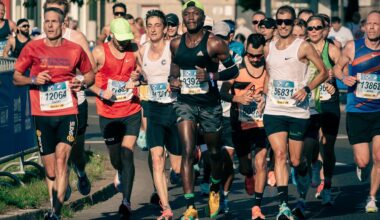Role of Nutrition to Support Strength Training in Rehabilitation
Nutrition plays a critical role in supporting strength training during rehabilitation. It’s essential to understand how diet impacts recovery and performance levels. Various nutrients contribute uniquely to muscle repair, energy levels, and overall health. Macronutrients such as proteins, fats, and carbohydrates are particularly significant. Proteins are essential for the repair of damaged tissues, and their adequate intake can aid in accelerating the healing process. Foods like lean meats, dairy, beans, and legumes are excellent sources of protein. Carbohydrates function as energy fuels that help sustain high-intensity workouts. Optimal carbohydrate consumption can enhance training outcomes by replenishing glycogen stores post-exercise. Healthy fats, found in sources like nuts, seeds, and avocados, also provide energy and support cell membrane health. Furthermore, hydration is crucial for maintaining optimal performance. Water helps transport nutrients, regulate body temperature, and alleviate exercise-related fatigue. Supplementing with vitamins and minerals like calcium, vitamin D, and magnesium can further enhance recovery. Proper nutrition not only supports strength training but also boosts overall well-being and reduces the risk of further injuries.
A successful rehabilitation program requires a well-structured meal plan that complements strength training. This plan should be individualized, taking into consideration the person’s specific needs, medical conditions, and fitness goals. Consulting with a nutritionist can provide tailored recommendations. It’s vital to balance macronutrients effectively to optimize performance and support recovery. For instance, an athlete recovering from a muscle injury may require more protein than someone engaged in regular exercise without injury. It’s also important to avoid processed foods that can hinder recovery due to their inflammatory properties. Focusing on whole, nutrient-dense foods can aid the rehabilitation process significantly. This includes an array of colorful fruits and vegetables that contain antioxidants, which help combat oxidative stress. Strong muscles are supported by strong bones; hence, incorporating calcium-rich foods is necessary. Maintaining an adequate intake of omega-3 fatty acids can also reduce inflammation and promote healing. Each meal should ideally contain a source of protein, healthy fats, and carbohydrates. In combination with a consistent strength training regimen, this strategy enhances recovery potential and improves performance during rehabilitation.
The Importance of Timing in Nutritional Intake
The timing of nutrient intake can significantly influence rehabilitation outcomes. Consuming the right nutrients at specific times can amplify the effectiveness of strength training. After strength training sessions, it is crucial to consume a combination of protein and carbohydrates to support recovery. This post-workout window, often termed the “anabolic window,” is when muscle glycogen replenishment and repair processes peak. Ideally, a balanced snack or meal should be consumed within 30 to 60 minutes post-exercise for maximum effect. This can involve protein shakes, yogurt with fruit, or a sandwich with lean protein. Additionally, spreading protein intake throughout the day can ensure consistent muscle protein synthesis. Aim for a source of protein in every meal, as this can enhance overall muscle recovery. Furthermore, hydration must be maintained before, during, and after exercise to support optimal performance. Meeting daily fluid intake recommendations can help prevent dehydration, which is essential for all bodily functions. A nutrient-rich plan combined with appropriate timing can significantly help an individual progress in both strength training and recovery during rehabilitation.
Supplementation can further complement dietary intake during rehabilitation. Various supplements may serve specific needs that arise during recovery. For instance, whey protein powders are a convenient way to increase protein intake, promoting muscle repair and growth. Creatine has shown potential in enhancing strength and recovery rates. Incorporating nutritional supplements should be done mindfully, as some individuals may need to avoid specific supplements due to allergies or medical conditions. It’s always wise to consult with a healthcare professional before starting any supplementation. Additionally, multivitamins can offer an all-in-one solution for those who may struggle to meet their daily nutrient needs through food alone. The role of nutrition extends beyond just muscle repair; it encompasses overall health, energy levels, and mental well-being. A holistic approach that integrates appropriate strength training, nutrition, and rest can optimize recovery. Paying attention to micronutrients like zinc, vitamin C, and various B vitamins is also necessary as they support enzymatic processes crucial for recovery. A diverse and well-planned diet can bolster efforts during rehabilitation, making it easier to achieve desired strength training outcomes.
Role of Hydration in Rehabilitation
Hydration should not be underestimated in any rehabilitation program, particularly during strength training. Water plays numerous essential roles, including nutrient transportation, temperature regulation, and joint lubrication. Pairing adequate hydration with nutritional strategies can promote efficient recovery after strength workouts. It’s crucial that individuals hydrate before, during, and after their exercise sessions to support overall performance. Dehydration can lead to fatigue, reduced strength levels, and longer recovery times. Additionally, electrolytes such as sodium, potassium, and magnesium can benefit recovery by restoring balance lost during sweat. Incorporating electrolyte-rich foods like bananas, coconut water, and leafy greens can supplement hydration efforts effectively. In some cases, individuals may also opt for electrolyte drinks, particularly during intense training regimes. Aiming for clear urine is a practical guideline to ensure proper hydration levels are met. Furthermore, thirst is not always a reliable indicator of hydration status, particularly during physical activity. Therefore, setting a regular hydration schedule throughout the day, especially in the lead-up to training, is vital. By prioritizing hydration, individuals can optimize their capacity for recovery and make substantial gains during strength training routines.
Incorporating a combination of nutrition and strength training can lead to successful rehabilitation outcomes. Education on the importance of tailored nutrition during recovery should be prioritized. Patients often lack awareness of the significance that food choices hold in relation to recovery and performance. By providing resources that emphasize the role of nutrients, individuals can better understand how to harness nutrition for healing. Community workshops led by registered dietitians can help increase this awareness, making rehabilitation more effective. Additionally, progress monitoring becomes vital; tracking nutritional intake through physical diaries or apps can help individuals remain accountable. Regular follow-ups with healthcare providers can aid patients in adjusting their nutrition plans based on progress and needs. Setting realistic nutritional goals is also fundamental to the rehabilitation process. These may include planned meals, cooking classes, or even grocery shopping guidance. Understanding one’s body signals is crucial, fostering a better connection to food. When rehabilitation is approached from a holistic standpoint that prioritizes nutrition alongside strength training, significant advancements can be made in recovery periods, enhancing overall quality of life moving forward.
Conclusion: A Holistic Approach to Recovery
In summary, a holistic approach to nutrition and strength training is essential in rehabilitation. This includes understanding the need for adequate macronutrients, micronutrients, and hydration. Leveraging the synergy between strength training and a well-balanced diet lays the groundwork for effective recovery strategies. It’s important to acknowledge that rehabilitation is a gradual process requiring patience and dedication. Every individual is unique, and their nutritional strategies must reflect their personal needs and recovery goals. Engaging with qualified professionals on this journey is advised to ensure they navigate their rehabilitation effectively. Whether the goal is to return to high-level sports or to regain daily functional strength, nutrition can significantly influence the entire process. Collectively, nutrition and strength training interplay to enhance muscle strength and overall well-being. It can accelerate recovery times and minimize future injury risks. Once patients recognize the vital role nutrition plays in their rehabilitation experience, they can take actionable steps toward improvement. Fostering these habits can ultimately empower individuals, preparing their body and mind for a successful return to activity.
Nutrition and rehabilitation is a journey, not a destination. Careful planning and thoughtful execution can yield significant results over time. Strength training should be paired effectively with nutritious eating habits. Acquiring knowledge about healthy foods empowers individuals to make smarter choices easily. Frequent assessment of progress can sustain motivation throughout the rehabilitation process. Little changes in daily dietary habits can lead to substantial outcomes. Encouraging discussion within support groups can help provide additional insights on successful strategies. Additionally, utilizing mobile applications to track food intake can strengthen accountability. Continuous learning on nutrition helps individuals grow more engaged with their health journeys. They will become empowered in finding balance within their diets and exercise regimens. Education on food’s strategic role during recovery should always be a primary focus. Recovery is about finding sustainable practices that individuals can maintain long term. Emphasizing both physical and psychological wellness significantly escalates recovery efforts. The destination should encompass strength, resilience, and vitality. By embracing this journey, individuals can transform their approach toward health. The interconnected journey of nutrition and rehabilitation leads to a brighter, stronger future.


